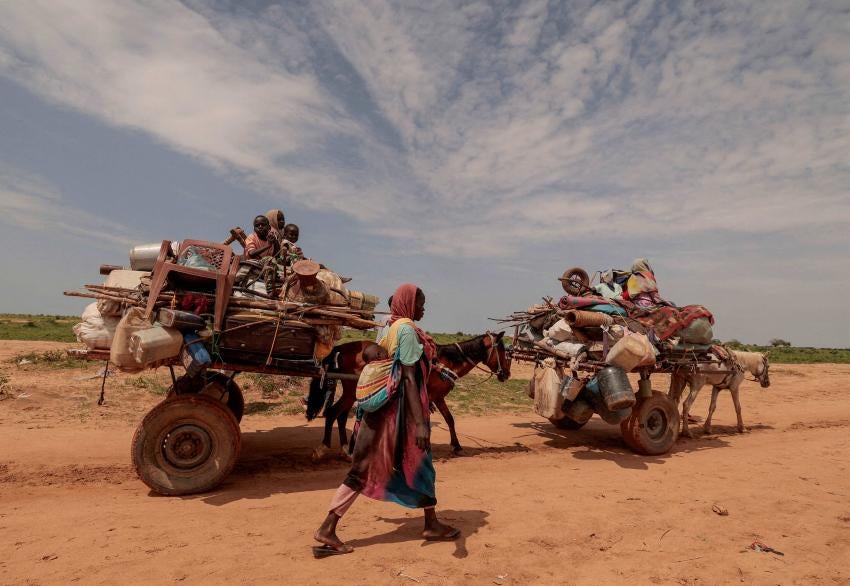Khartoum, September 12 (Darfur 24)
People looking for shelter to enter the refugee camp located 5 kilometers from the Chadian border with Sudan. Most of these people had previously been internally displaced in the Darfur region.
The ongoing conflict in Sudan has caused the death and injury of thousands and the displacement of millions, creating a catastrophic situation amidst the stagnation in the political scene and the failure of attempts aimed at a permanent ceasefire between the two parties.
As of August, the number of casualties reached 1,146 dead in addition to twelve thousand wounded, according to the Sudanese Ministry of Health.
The conflict has displaced more than 4.3 million people, including 3.4 internally displaced persons and nearly a million refugees in Ethiopia, Chad, the Central African Republic, South Sudan and Egypt.
The conflict has deprived millions of people of access to food, water, shelter, electricity and basic services, including nutrition, health care and education.
These are some of what was stated in the report of the Secretary-General of the United Nations on the situation in Sudan and the activities of the United Nations Integrated Assistance Mission during the transitional period in Sudan (UNITAMS).
The report submitted to the UN Security Council – which was issued on Monday – covered the developments that Sudan witnessed during the period between May 7 and August 20.
Political deadlock
The report indicated that the political situation has deteriorated significantly due to continued fighting between the Sudanese Armed Forces and the Rapid Support Forces since April 15.
The violence was concentrated in the cities of Khartoum, Omdurman and Bahri.
The Rapid Support Forces took control of most of the capital and Darfur, with the exception of parts of El Fasher and Nyala, while the armed forces remained in control of the northern and eastern parts of the country and most areas in the states of South Kordofan and Blue Nile.
The report indicated that regional and international diplomatic initiatives did not succeed in stopping the fighting, as both sides remained determined to achieve a military victory.
Amid continuing violence, international and regional peace efforts have intensified to ensure a ceasefire and humanitarian access. The most recent of these efforts included the “Sudan Neighboring Countries Summit” organized by Egypt on July 13. The conference brought together the heads of state and government of countries neighboring Sudan, the Chairman of the African Union Commission, and the Secretary-General of the League of Arab States.
The final statement called on both parties to adhere to an immediate and sustainable ceasefire and respect Sudan’s sovereignty and territorial integrity, and stressed the need to end any external interference.
Sudanese civilian actors – including political forces, women’s rights groups, youth networks, resistance committees, civil society and academia – also continued to oppose the war and call for dialogue. Several women-led initiatives have also emerged calling for a ceasefire, highlighting humanitarian needs, and condemning conflict-related sexual violence.
Security situation
Large parts of Sudan are witnessing sporadic fighting between the army and the Rapid Support Forces.
In Darfur, the conflict escalated into systematic ethnic-based violence against civilians and tribal tensions intensified. The conflict in the states of South Darfur, Central Darfur, and West Darfur caused the death of dozens of people and the displacement of thousands.
The state of North Kordofan, with its capital, El Obeid, also witnessed conflict between the two warring parties. In South Kordofan state, elements of the Sudan People’s Liberation Movement-North, led by Abdel Aziz Al-Hilu, attempted to achieve progress in government-controlled territory.
A catastrophic humanitarian situation is reflected in the human rights situation
The report stated that there has been a significant deterioration in the situation of human rights and the protection of civilians. Civilian losses and injuries have increased, especially in Khartoum and Darfur, and the escalation of violence in densely populated areas has led to large numbers of civilian casualties and widespread destruction of infrastructure.
On the humanitarian level, the report explained that the conflict had a catastrophic impact on the humanitarian situation. Humanitarian activities have been halted due to widespread insecurity, and this situation has been exacerbated by the widespread looting of humanitarian assets.
Even before the conflict, a third of Sudan’s population – nearly 16 million people – were in need of humanitarian assistance. After the war, the number rose to nearly 28 million people, an increase of 57 percent.
Funding needs for the 2023 Humanitarian Response Plan increased by 47 percent to $2.6 billion, but only 25.7 percent of this funding was received.

